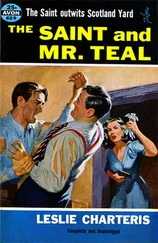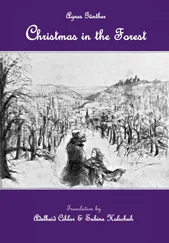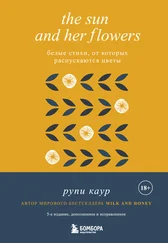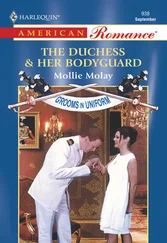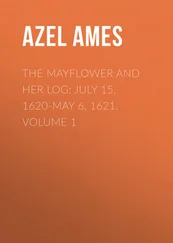„No mother knows that.”
„My mother had surely not known either otherwise she would have taken me with her. Baby Jesus grew up and people made him suffer. Is it true that she was forced to stand there and watch while he suffered his death?”
„Little Rose, please don’t cry! You have been through so much today.”
She looks at him with soft, bewildered eyes, tears still running down her cheeks.
„But mustn’t you cry at the thought of it?”
There is complete silence in the large room, only the sound of rustling in the pine tree, as some wax drips down from the candles, which are burning down so fast. The child does not await an answer. She gazes into the rosy pink glow, at the sleeping Mary and the sheltered child. It is the kind of silence which has become so rare in our hurried and harried world full of good and evil; a silence which turns into the sweet tones of a harp in our souls, capturing the sounds of eternity within. It is this moment of silence which ties the bond of love between them, the golden ribbon from heaven’s door that they had seen in the crystal forest.
As for his wounded soul, it is the soul of an artist which feels in pictures and tones, so he closes his eyes and visualises again the boulevard leading to heaven’s door and Saint Rose with the sun-crown on her head. She is walking with him to a heavenly site, golden in its glory and representing the vision of his lost home. As they arrive at the very threshold of this beautiful image painted by the hands of Christ, his father is standing there, looking out for his tired, sinful, homesick and lost son. And a deep sigh emerges from the bottom of his heart as if freeing him of all guilt and his soul releases the arrow which had speared his heart.
Frau Scheiterlein enters with the steaming porridge in a brightly glazed bowl. The child only manages to eat a few spoons full of it; too much has assailed her little heart today.
„Take me in your arms. I wish to look into the crib.”
For a short moment the child’s large, grey eyes dance in the light of the smouldering glow. Then, as she closes them, a vivid dream spills over her.
From a distance, a familiar voice finds its way into her colourful images: „My darling, my poor child! Who would ever have thought she would do such a thing!”
„Father...” she whispers from afar, and lets the dreamboat of her mind take her away to new shores, until it comes to a halt on the grey banks of morning.
Chapter 2
A chocolate-coloured coachman appears and hands over a message to the tall servant in his woollen coat, who is just shovelling a straight path from the gate to the entrance of the ruin with a snow shovel.
„Urgent message,” he growls. „Need an answer immediately.”
The servant takes the message in his calloused, huge hand and goes to the door, being already directly in the midst of Thorstein Castle. The Earl is working at his easel, with coloured chalk on grey construction paper. His forehead wrinkles as he reads the letter. It is an amiable invitation for today’s Christmas Eve festivity in Brauneck.
My little girl seems to fervently hope for your appearance.
The Earl of Thorstein turns the invitation card in his hand with grim embarrassment, thinking of his worn-out jacket. His hand runs nervously through his brown, curly hair.
P.S. After the ceremony, it will be just among us.
Between the lines, he discerns her begging eyes.
„No objection could be raised to this” he mumbles, „despite the old coat,” and with long steps he hurries onto the yard outside where the coachman is trying to communicate with his servant, with the so typical characteristic mixture of contempt and condescension of these people. He straightens up to a correct body posture when he sees the Earl coming.
„Inform His Highness that I will attend.” The Thorsteiner does not unnecessarily deal with paper and ink. As soon as the coachman disappears, he speaks out in a thundering voice:
„Mart! Bring me the boxes four and five!” His strong voice vibrates and wakes up the well, which murmurs softly. This is necessary, for the servant is almost deaf.
In former times, when his hearing had been better, he used to be a worker for the Earl’s father, and then he had become a servant in the castle and even though his master appreciated him because of his strength and his loyalty, his increasing loss of hearing made it difficult for him to get along with the other servants. They teased him or maybe he had just assumed they did, and the red-haired Minnie ridiculed his shy love until one day, he found himself in a severe situation, due to his strength and suppressed anger, which could easily turn him into a dangerous man. One evening, as he was sitting in a semi-dark barn beside a wagon full of hay, he heard the muffled voices of the maids and workers laughing and he heard the high voice of Minnie and the deep one of the handsome Beckenkarl. He believed to hear his own name and his dull pain suddenly changed into hot anger.
That same night, he did not appear for dinner and had a terrible nightmare. He sees the hedge along the castle wall and a body lying with his face in a puddle of blood. On the side, staring, is his mother with her black bonnet, in her arm the large, silver lined hymnbook, exactly the way he likes to remember her, but she lifts her hands in the air with a horrified expression.
The next morning, he gave notice with such wild gestures that he was let go, although there was urgent need of servants and workers. He returned home, even though he could only visit his mother on a hill with the black cross, at her grave. He worked as a simple labourer; a gloomy and inaccessible person, whom children fearfully avoided.
One day, he finds his former master’s son, sitting with his easel in a meadow. The Earl recognises him at once and greets him in a friendly way. His voice reminds the sad man of the nice memories during his years as a servant, where he had been without affliction, a cheerful person and a good soldier.
Some days later, after work, he appeared at the ruin and began to clear away the stones, sort out the rubble and throw out what was not needed into the deep moat. When the Earl came out, he would salute and then continue with his work until late at night. He refused to accept any recompense, for he said it was his free time, in which he could do as he wished. He continued his work for some time, hardly accepting bread or water. It seemed to please him to be close to a person he had known from this earlier time in life.
Due to some sold drawings, the Earl was soon able to afford a day labourer. Mart began to build himself a steep staircase from the beams he found among the rubble, leading from the ground to a niche in the wall of the castle keep. He broadened the opening so he could squeeze himself through. Then he constructed a spiral staircase leading farther up to a cosy room, which had been used as a loft for the pigeons. There he made himself comfortable, together with the pair of doves, which he dearly loved. This draughty place was where he now lived and on Sundays, he hammered and worked on it to make it a home. The doves had their separate little space; bits of window glass could be found everywhere and he constructed their own little sheltered look out.
Climbing about dangerously, he managed to lift up a bed, his chest, a treasured hand mirror and a large framed painting. It was a painting of him wildly galloping on a magnificent white horse in bold and daring position and a raised sabre. On his collar, a small photography of his young, ambitious face had been glued on. This painting was his most precious treasure, besides his mother’s silver lined hymnbook, which he had protectively wrapped into a red handkerchief in the chest.With great difficulty, he hung up the painting on the rough wall, set up his bed and chest and his home was more or less furnished. The Earl brought to his attention that his way to work would be much longer now, but Mart shrugged and replied that he only planned to do paid labour during winter-time, when refurbishing the ruin would be difficult. The rest of his time he wished to live and work in the ruin. This would surely make up for the free room.
Читать дальше






